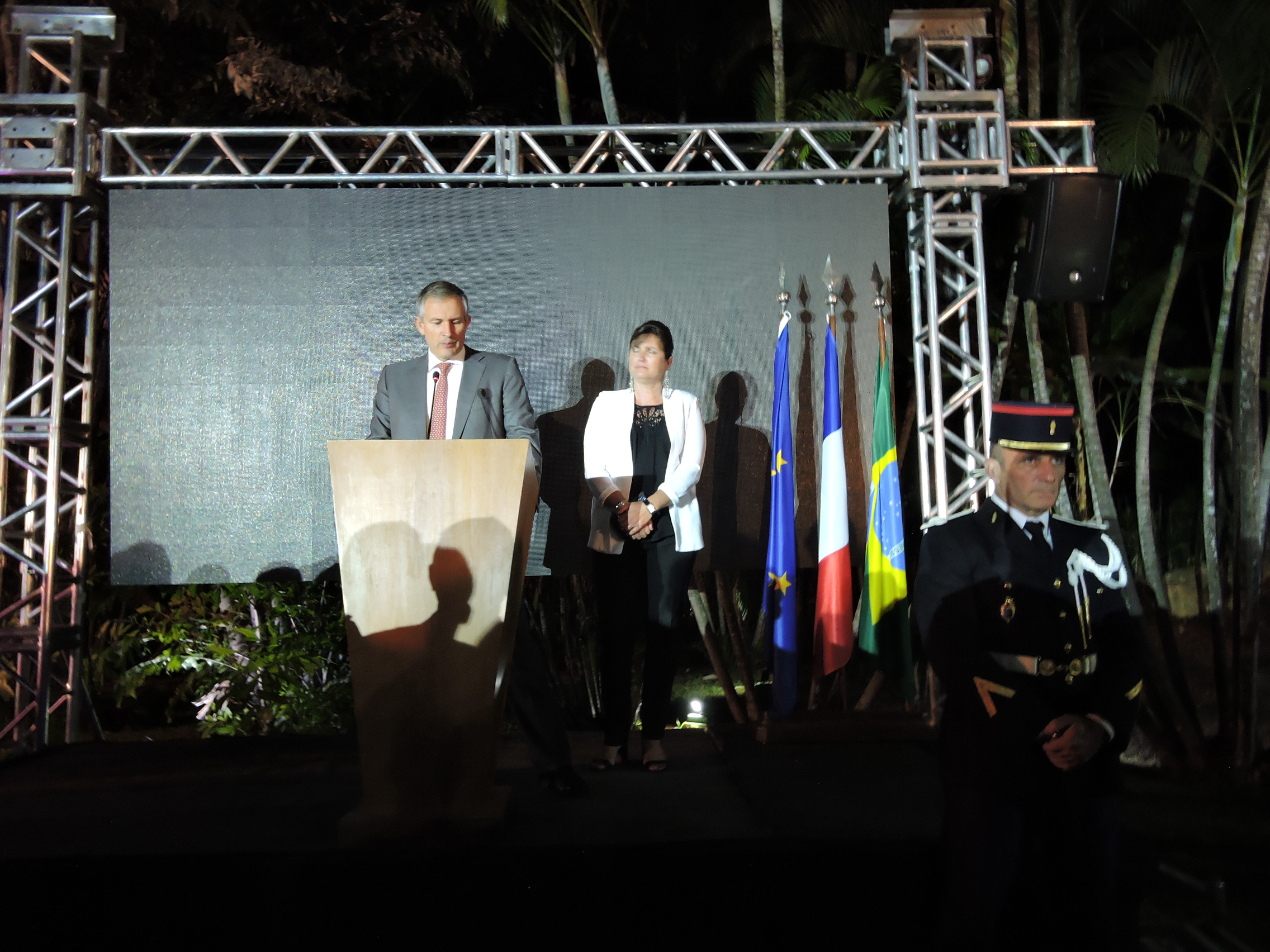[:pb]In Brasília, ambassador asks for a minute of silence for the victims in Nice
The great reception at the embassy of France to celebrate the French National Day was marked by the feeling of joy, but also sadness for the dozens of victims of the running over in Nice, on the South of the country. It was at the moment that the guests arrived at the French embassy, for the traditional party of July 14, that the ambassador Laurent Bili was informed of the tragic event in Nice. The ambassador payed a silent tribute to the people that died in what he have considered an “act of barbarism”.

According to the ambassador, although the French nation is living this moment of probation, the country continues to be strong and united as it was never before. They know that it is by making fully assert of its values of liberty, equality and fraternity that it can overcome the ideologies of hatred.
In his speech, made in Portuguese, the ambassador has also announced that the French president, François Hollande, will be present in the Olympic Games in Rio de Janeiro, in August, and made a veiled critic to the United Kingdom, which has chosen to leave the European Union. “France is proud of being an open country to the world, we are proud of the diversity of the origin of our beliefs, that is honored in all areas of the French society”, said Bili.
Messages – The day after the attack in Nice, the ambassador Laurent Bili thanked, in official note, the many messages of condolence and solidarity received by the Embassy of France, by means of the government and of Brazilian citizens shocked such as the French with the barbarian act. The messages, according to the ambassador, show the deepness of the friendship that united the Brazilian and the French peoples, “this friendship was funded in the shared values of liberty, fraternity and equality and of refusal of the hate and intolerance”.
History – The revolutionary French day became a national party; today, the July 14 associates military parades and parties with balls and fireworks. The Storming of the Bastille, July 14 in 1789, was celebrated in France over a hundred years ago. Today the French people prefer to celebrate the national day as the party of the Federation occurred in July 14 in 1790, the first anniversary of the insurrection. In Paris, at the Campus Martius, a Mass is celebrated by Talleyrand, at the altar of the country.
Storming of the Bastille – On the first months of the French Revolution, there reigned a great excitement in Paris. At the spring of 1789, the General State have refused to dissolve itself and have transformed into National Constituent Assembly. In July, the King Louis XVI sends new troops come and dismisses Necker, the popular minister. On the morning of July 14, the people of Paris plunders the Les Invalides (military facilities designed to house wounded soldiers in combat) seizing weapons and heading then to an old royal fortress, the Bastille.
After a bloody gun battle, the fortress is occupied and some prisoners are freed. The storming of the Bastille is the first victory of the people of Paris against a symbol of the Old Regime. The building was incidentally demolished in the coming months.
The national party – In the following years, the celebration of July 14, 1789, is abandoned until the Third Republic, in particular Gambetta, then mayor, endeavor to conclude the foundations of the regime. On a proposal by Benjamin Raspail, the law of July 6, 1880 turns 14 July National Republic Party.
From the beginning, patriotic character and military demonstration was highlighted as a testimony to the uplifting of France after the defeat of 1870. All municipalities participate. The party begins with a solemn torchlight parade and fanfare of the square of weapons to the barracks, on day 13. The next day, the church bells and gun salutes announce the big parade, followed by a lunch and shows of games. Dances and fireworks conclude the day.
Franceses comemoram, consternados, a Festa da Federação
Em Brasília, embaixador pede um minuto de silêncio pelas vítimas em Nice
A grande recepção na Embaixada da França para celebrar a data nacional francesa foi marcada pelo sentimento de alegria, mas também de tristeza, pelas dezenas de vítimas de atropelamento em Nice, no Sul do país. Foi no momento da chegada dos convidados à Embaixada da França, para a tradicional festa do 14 de Julho, que o Embaixador Laurent Bili foi informado do trágico acontecimento em Nice. O embaixador fez uma homenagem silenciosa às pessoas que morreram no que considerou “um ato de barbárie”.
Laurent Bili agradeceu a solidariedade das autoridades brasileiras e do povo brasileiro desde os atentados em Paris, em 2015. “Aqui mesmo em Brasília, os principais prédios públicos exibiram as cores da França”, lembrou o diplomata francês, que mencionou ainda a escola de samba Vai Vai que também rendeu homenagem à França no carnaval de São Paulo. Em novembro, explosões e tiroteios coordenados na capital francesa deixaram 130 mortos.
Segundo o embaixador, apesar de a nação francesa viver esse momento de provação, o país continua mais forte e mais unido do que nunca. Ela sabe que é fazendo valer plenamente seus valores de liberdade, igualdade e fraternidade que ela poderá vencer as ideologias do ódio.
No discurso feito em português, o embaixador também anunciou que o presidente francês, François Hollande, estará presente nas Olimpíadas do Rio de Janeiro, em agosto, e fez uma crítica velada ao Reino Unido, que escolheu deixar a União Europeia. “A França tem orgulho de ser um país aberto ao mundo, tem orgulho da diversidade das origens de suas crianças que lhe honram em todas as áreas da sociedade francesa”, disse Laurent Bili.
Mensagens – No dia seguinte ao atentado em Nice, o embaixador Laurent Bili agradeceu, em nota oficial, as inúmeras mensagens de condolências e de solidariedade recebidas pela Embaixada da França, por meio do governo ou de cidadãos brasileiros chocados tanto quanto os franceses com o ato bárbaro. As mensagens, de acordo com o embaixador, mostram a profunda amizade que une os povos francês e brasileiro, “amizade essa fundada nos valores partilhados de liberdade, igualdade e fraternidade e de recusa ao ódio e à intolerância”.
História – Data revolucionária francesa que se tornou festa nacional, hoje o 14 de julho associa desfiles militares e festejos com bailes e fogos de artifício. A tomada da Bastilha, em 14 de julho de 1789, foi comemorada na França há mais de um século. Hoje os franceses preferem celebrar a data nacional como a “festa da Federação” ocorrida em 14 de julho de 1790, o primeiro aniversário da insurreição. Em Paris, no Campo de Marte, uma missa é celebrada por Talleyrand, no altar da pátria.
A tomada da Bastilha – Nos primeiros meses da Revolução Francesa, reinava uma grande agitação em Paris. Na primavera de 1789, os Estados Gerais recusaram-se a se dissolver e transformaram-se em Assembléia Nacional Constituinte. Em julho, o rei Luís XVI mandou vir novas tropas e demitiu Necker, então ministro popular. Na manhã de 14 de julho, o povo de Paris saqueou o Hôtel des Invalides (dependências militares destinadas a abrigar soldados feridos em combate) apreendendo armas e dirigindo-se em seguida a uma velha fortaleza real, a Bastilha.
Depois de um sangrento tiroteio, a fortaleza foi ocupada e alguns prisioneiros que ali se encontravam foram libertos. A tomada da Bastilha é a primeira vitória do povo Francês contra um símbolo do Antigo Regime. O edifício, aliás, foi demolido nos meses seguintes.
A festa nacional – Nos anos seguintes, a comemoração do 14 de julho de 1789 é abandonada, até que a Terceira República, em particular Gambetta, então presidente da Câmara, procura celebrar os fundamentos do regime. Sob proposta do deputado Benjamin Raspail, a lei de 6 de julho de 1880 transforma o 14 de julho em festa nacional da República.
Desde o início, destaca-se o caráter patriótico e militar da manifestação, como um testemunho do reerguimento da França após a derrota de 1870. Todas as comunas participam. A festa tem início com um desfile solene com tochas e fanfarra da praça das armas à caserna, na noite do dia 13. No dia seguinte, os sinos das igrejas e as salvas de tiros anunciam o grande desfile, seguido de um almoço e de espetáculos de jogos. Os bailes e fogos de artifício encerram o dia.
[:]


















